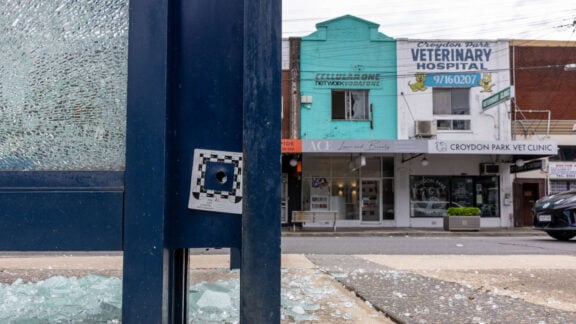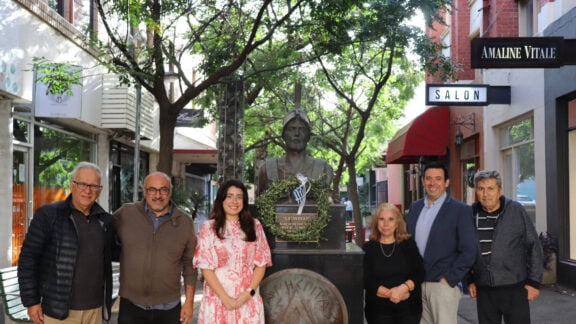For Neos Kosmos, the irony and symbolism of meeting up with former Soccer Australia chief David Hill the day after Heidelberg secured its famous FFA Cup round-of-32 victory is not lost.
Hill was the man who took charge of Australian soccer in the mid 1990s and his first act as chairman was to cut Heidelberg from the National Soccer League (NSL).
The 71-year-old’s new book, The Fair and the Foul chronicles his controversial tenure as head of Australian Soccer between 1995 and 1998. Heidelberg coach George Katsakis, who oversaw the upset win over Perth Glory, remembers that time vividly and described it as the darkest period in the club’s existence.
“It was like cutting away the umbilical cord from a baby while it’s still in the womb,” he says.
“It just stopped it all. You’ve taken a lot of its history, you’ve taken a lot of its memories away from it.
“There were certain things done at board level that Soccer Australia did and reports that were written up by certain people that people didn’t agree with. But it’s the club that calls itself the people’s club, the warrior-type club, the club that rolls up its sleeves and fights back.”
And fight back it did. More than 20 years after its axing, Heidelberg’s upset win over Perth Glory in the FFA Cup isn’t just a Victorian NPL team beating the A-League professionals – for Katsakis it’s much more than that.
“It stands as one the greatest victories in the club’s history,” he says.
“Having to start all over again and achieving that victory – it’s one of the club’s greatest highlights.
“You talk about great teams over the journey of Australian football, and Heidelberg and Perth Glory are just that. Two giants existing back then and coming together today on the national stage with the introduction of the FFA Cup. It’s quite significant, isn’t it?
“It was definitely one of the things that drove us to that result. I’m really proud at the moment. A lot of people asked, ‘who was the A-League team? Was it Heidelberg or Perth Glory?’ It clearly indicated on the night that there wasn’t much difference between the two.”
Heidelberg was not the only club that was axed from the 1995-1996 NSL season, with Brunswick and Parramatta Melita also getting the chop. Hill said it was done because they failed to satisfy the Australian Soccer Federation’s minimum conditions for admission into the league.
“I didn’t make a judgement about any of those clubs, I made a decision based on their failure to meet the criteria,” he says.
“All of the NSL clubs in some respects failed to meet aspects of the criteria but those three clubs failed them all.
“They didn’t have the crowds, the facilities, they didn’t have the money, they didn’t have the seating. It was a whole raft of things dealing with the viability of the club, dealing with the financing of the club, the facilities of the spectators.
“In the book, I chronicle for 20 years the failure of the NSL to generate any support outside the migrant communities. Did I take over soccer so it would remain an enclave of a few ethnic groups? No. I wasn’t de-ethnising. This is the one protest I make. There is nothing wrong with those proud traditions and they should stay part of the club. But the clubs had to move mainstream or they should forever remain a minor sport.”
But when Hill announced Heidelberg’s axing, the Warriors didn’t go down without a fight. A crowd of 10,000 people attended a rally at Olympic Village to protest the decision and Hill recalls the remonstrations weren’t just consigned to Melbourne.
“I remember busloads of Macedonian Greeks, literally bus loads came up to Sydney to protest,” he says.
“They were all pissed these Macedonian Greeks and they had come overnight on the bus and they had a bit to drink as well. The headquarters of Soccer Australia was behind the Sydney Football Stadium in those days and the buses were parked there.
“The police turned up and I told them that I wanted to meet them. But the police said, ‘You are bloody not,’ but eventually I met a deputation of them and about ten of them came into Soccer Australia and they were really passionate.”
Hill is married to a Greek woman, is a supporter of Sydney Olympic and his son plays for Olympic’s under 16s youth team. So, at the time Berger fans felt betrayed by Hill because they thought he was a friend to their cause.
“They said to me, ‘You of all people, you really understand the Greeks,’ Hill recalled. ‘We voted for you’, and I said, ‘Why did you vote for me? You voted for me to fix soccer.’ They replied, ‘No, we didn’t! We voted for you to look after us,’ and I said, ‘No! ‘I’m not here for that. I’m here trying to mainstream soccer and realise its potential.’
“And that was the difference between what I was trying to do and what soccer administration had done in the past. It was there at the behest of the bloody stakeholders. It was entrenched vested interest and I wasn’t. And yes it did antagonise and upset a lot of traditionalists.”
The 1996/1997 season saw Perth Glory enter the NSL and Heidelberg found their way back into the league again as one half of the Collingwood Warriors who were backed by AFL side Collingwood.
Perth became one of the league’s success stories, winning two titles and drawing record crowds. Years later they would also become the template club for the A-League. But Collingwood survived for only one season and the Bergers were consigned to the Victorian State League where they have been ever since.
More than 20 years since Heidelberg’s axing from Australian football’s top tier, Katsakis says Wednesday night’s FFA Cup clash is another chance for the club to shine on the big stage again.
“Playing another powerhouse in Sydney United from the old NSL days is the biggest challenge to date,” he says.
“Because we are playing on a synthetic pitch that we’re definitely not used to. But this group of players can withstand anything that is put in front of them. They are all going to roll up their sleeves and dig deep and try and make the club proud.”
Katsakis added, “Of all the NPL clubs in Australia, at the moment we are one of the more significant going around. We staged a fixture against Melbourne City two years ago in front of a crowd of 11,500 which stands as a FFA Cup record. We beat Perth Glory in front of 4,500 people. Currently we are on top of the NPL, we won the Docherty Cup and we are alive in all competitions – that just shows you what hard work can do and what you can achieve.
“Our intention is to hopefully get a quarter final berth at home against another A-League club and try and show the whole footballing community that Heidelberg can achieve what it did against Melbourne City again this year.”








